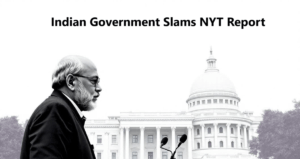Indian Government Slams NYT Report: 3 Shocking Facts Exposing Misleading Claims
The Indian government has strongly denied allegations made by The New York Times, calling its report misleading and inaccurate. The report claimed that Hindustan Aeronautics Limited (HAL) facilitated the transfer of sensitive British equipment from HR Smith Group, a donor to Reform UK, to Russia’s Rosoboronexport. It alleged that parts with identical product codes were sent to Russia within days, raising concerns about their potential military use in Ukraine.
Indian officials, however, insist that HAL has fully complied with international trade regulations and end-user commitments. They argue that the report distorts facts to push a specific political narrative. The government also criticized the publication for failing to conduct proper fact-checking before making such claims. Meanwhile, Western officials have warned companies to thoroughly verify their clients to prevent restricted technology from reaching Russia. The controversy highlights ongoing scrutiny over global arms trade amid the Ukraine conflict.

Indian Government Slams NYT Report: 3 Shocking Facts Exposing Misleading Claims
The Indian government has strongly denied a recent report by The New York Times (NYT), calling it “misleading” and “inaccurate.” The article claimed that Hindustan Aeronautics Limited (HAL), a state-owned aerospace company, facilitated the transfer of sensitive British technology and equipment from a donor of the UK’s Reform UK party to Russia’s state arms agency, Rosoboronexport. Indian officials dismissed the allegations, asserting HAL’s strict compliance with international trade laws.
Key Allegations in the NYT Report
According to the NYT investigation, the HR Smith Group—a British company that donated £100,000 (about $130,000) to Reform UK in 2023—supplied equipment to HAL. The report alleged that shortly after receiving these items, HAL sent components with identical identification codes to Russia. The parts in question reportedly have both civilian and military applications. British and American authorities have flagged such equipment as critical to Russia’s war efforts in Ukraine, raising concerns about potential misuse.
The NYT suggested that these transactions took place within days, implying a swift diversion of materials from India to Russia. Western officials cited in the report expressed alarm over the possibility of restricted goods reaching Russia through third countries, bypassing sanctions imposed after its invasion of Ukraine.
India’s Firm Rebuttal
Indian government sources, speaking anonymously, rejected the claims as baseless. They emphasized HAL’s adherence to international regulations, including strict compliance with strategic trade controls and end-user agreements. “HAL operates within a robust legal framework that governs all overseas transactions. The allegations distort facts and ignore due process,” an official stated.
Officials criticized the NYT for what they called a “lack of due diligence” and accused the publication of framing the issue to suit a “political narrative.” They reiterated India’s commitment to ethical trade practices and its reputation as a responsible global partner. “India has never and will never engage in activities that violate international norms. Our record in regulating defense and dual-use technologies is transparent,” the official added.
Broader Concerns Over Sanctions Evasion
The NYT report reflects growing unease among Western nations about Russia’s ability to circumvent sanctions through intermediaries. U.S. and UK authorities have repeatedly urged exporters to tighten due diligence to prevent restricted goods—especially dual-use technologies—from reaching Russia. Components like semiconductors, navigation systems, and aviation parts are particularly sought after, as they can be used to repair or upgrade military hardware damaged in the Ukraine conflict.
While the report did not provide conclusive evidence of HAL’s direct involvement in sanctions evasion, it underscored the challenges of monitoring global supply chains. Experts note that tracking the movement of small, high-value components is complex, especially when they are routed through multiple countries.
India’s Stance on the Russia-Ukraine Conflict
India has maintained a neutral stance on the Russia-Ukraine war, advocating for dialogue while continuing economic and defense ties with Moscow. The country has increased imports of discounted Russian oil, drawing criticism from Western allies. However, India has consistently asserted that its dealings with Russia comply with international laws and do not directly support the war.
The government’s sharp response to the NYT report aligns with its efforts to protect the credibility of its defense sector. HAL, a key player in India’s aerospace industry, manufactures aircraft and helicopters for the military and has partnerships with global defense giants like Boeing and Lockheed Martin. Any controversy surrounding its operations could impact these collaborations.
Calls for Transparency and Vigilance
The incident has sparked calls for greater transparency in international trade. Western officials stress the need for companies to rigorously vet partners and track shipments to prevent the unintended diversion of sensitive technologies. “Exporters must ensure their products don’t end up in conflict zones or bolster hostile regimes,” a European trade expert remarked.
For now, India has dismissed the NYT report as speculative. However, the controversy highlights the delicate balance nations face in maintaining economic ties while adhering to global sanctions. As the Ukraine war drags on, scrutiny of supply chains—and diplomatic tensions over compliance—are likely to intensify.
You must be logged in to post a comment.